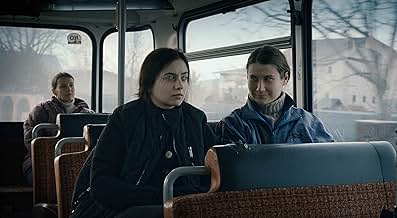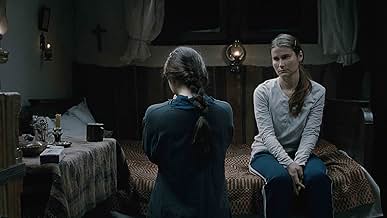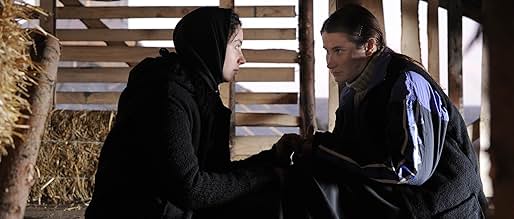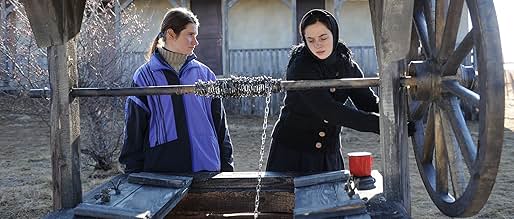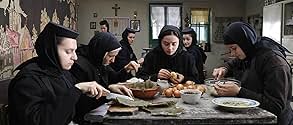IMDb रेटिंग
7.5/10
14 हज़ार
आपकी रेटिंग
एक ही अनाथालय में पली-बढ़ी दो युवतियों की दोस्ती; एक को रोमानिया के एक कॉन्वेंट में शरण मिली लेकिन उसने अपनी दोस्त को छोड़ कर जाने से इंकार कर दिया है, जो अब जर्मनी में रहती है.एक ही अनाथालय में पली-बढ़ी दो युवतियों की दोस्ती; एक को रोमानिया के एक कॉन्वेंट में शरण मिली लेकिन उसने अपनी दोस्त को छोड़ कर जाने से इंकार कर दिया है, जो अब जर्मनी में रहती है.एक ही अनाथालय में पली-बढ़ी दो युवतियों की दोस्ती; एक को रोमानिया के एक कॉन्वेंट में शरण मिली लेकिन उसने अपनी दोस्त को छोड़ कर जाने से इंकार कर दिया है, जो अब जर्मनी में रहती है.
- निर्देशक
- लेखक
- स्टार
- पुरस्कार
- 8 जीत और कुल 19 नामांकन
Valeriu Andriuta
- Priest
- (as Valeriu Andriutã)
फ़ीचर्ड समीक्षाएं
A grim and intense story about love, faith, the presence of God and the absence of God, slowly penetrates the viewer's mind, so slowly that it takes Director and Screenplayer Cristian Mungiu more than two hours to make a convincing case for redemption. No doubt that he has a skilled team, to include Oleg Mutu (cinematography). This is not a horror movie; what is horrifying is the knowledge that it is based on a real story of a 2005 Christian Orthodox exorcism gone wrong, somewhere beyond the hills of Moldavia (a region in Eastern Romania). The scariest aspect is that it can happen to you, no need for a monastery or any kind of mental illness. All it takes is to express disdain against a highly controlled environment, the kind of environment that requires continuously patching the stove such that no smoke comes out to spoil the harmony of a strict yet loving family. The movie builds upon the viewer's expectancy that what can go wrong it will, and, with a remarkable lack of explicit violence, creates a gripping parallel reality where all imaginary roads are paved with good, harmful intentions. Both the priest and the doctor want to help, each in his system of reference. The police are interested in helping too, to the best of their ability. In the end, it's hard to blame or hate anybody for the strange turn of events. Even the priest (Valeriu Andriuta) draws some sympathy for his apparent lack of options. But hey, there is a bright side to this bleak work of art, not a masterpiece but still an outstanding work of art: the thin line between desire and rejection drawn by Cosmina Stratan (Voichita) and Cristina Flutur (Alina). Patched with moments of fragile silence and delicate whispers, their relationship evolves into one of the most tender and frightening love stories. Now, who harbors the Devil is still up for debate
Albert Camus said, "The evil that is in the world almost always comes of ignorance, and good intentions may do as much harm as malevolence if they lack understanding." These words become prophetic in Romanian director Cristian Mungui's Beyond the Hills, a powerful tale of religious and emotional obsession that leads to tragic consequences. Like his award winning abortion drama, 4 Months, 3 weeks and 2 Days, the Palme d'Or winner at Cannes in 2007, it is deliberately paced and can be demanding to the viewer unaccustomed to long takes without cuts or camera movements. Set in a remote Orthodox Christian convent in rural Moldova known as New Hill Monastery, Beyond the Hills is a social drama based on two books labeled "nonfiction novels" by Romanian journalist Tatiana Niculescu Bran concerning an exorcism in 2005 that became sensationalized in the press.
Filmed in -15 degree weather during the heaviest snow season in years, Oleg Mutu's cinematography makes us feel the bleakness and the cold, damp air inside a convent that has no electricity or running water. As the film begins, Alina (Cristina Flutur) has returned from Berlin to the town in which she grew up. She is met at the train station by Voichita (Cosmina Stratan), her best friend and partner since their years together in an orphanage. Voichita believes she has found her direction, however, in the convent where she is a novice and has become emotionally attached to the priest she calls "Papa" (Valeriu Andriuta) and the mother superior (Dana Tapalaga).
Alina, a sometimes believer, has come to rescue her friend from what she feels is the church's domination and is unprepared for Voichita's unwillingness to leave with her and work together on a German cruise ship. She tells Alina that she has found a sense of family and has been changed by her experience. Though she lovingly invites her friend to give herself to the Lord, Alina feels betrayed. A tug of war develops between the church's fear of the "unbeliever", and their wish to provide sanctuary, knowing that Alina has nowhere else to go. Under threat by those around her, Voichita finds herself torn between her one and only friend and her devotion to God.
Desperate for affection, Alina flirts with suicide and her growing paranoia makes her suspicious of everyone in Voichita's life. Soon, her repeated fits of hysteria land her in the local hospital, but the anti-psychotic drugs provide only a temporary solution. When the doctors tell the priest that there is nothing further they can do to help, Alina is returned to the convent but the situation does not improve. The distraught girl does leave on her own to go back to her last foster home, but gives up all her possessions and returns to the monastery, unable to stay away from Voichita.
Ultimately, the priest is convinced that she is not just a sinner, but one possessed by the devil and must undergo an exorcism. Without her consent, Alina is tied to a cross with ropes and chains and her mouth gagged to prevent her screaming as the service is performed. Beyond the Hills is an intense and haunting film, and the performances of Flutur and Stratan, who shared the Best Actress award at Cannes, add depth and complexity to the film's moral universe. Under Mungui's direction, the film avoids pointing the finger. There are no good guys and bad guys and everyone involved thinks they are acting in Alina's best interests, but they are sadly myopic.
Regardless of their good intentions, each character is so caught up in the narrow scope of their vision that they cannot see beyond their immediate self-interest. What becomes lost is the ability to look beyond rituals and forms to find the substance - love, charity, and compassion. According to Mungui, the film "speaks about guilt but is more concerned with love and choices, with the things people do in the name of their beliefs, the difficulty of telling good from bad, understanding religion literally, indifference as an even greater sin than intolerance and freedom of will." When these factors are present, tragedy cannot be far away.
Filmed in -15 degree weather during the heaviest snow season in years, Oleg Mutu's cinematography makes us feel the bleakness and the cold, damp air inside a convent that has no electricity or running water. As the film begins, Alina (Cristina Flutur) has returned from Berlin to the town in which she grew up. She is met at the train station by Voichita (Cosmina Stratan), her best friend and partner since their years together in an orphanage. Voichita believes she has found her direction, however, in the convent where she is a novice and has become emotionally attached to the priest she calls "Papa" (Valeriu Andriuta) and the mother superior (Dana Tapalaga).
Alina, a sometimes believer, has come to rescue her friend from what she feels is the church's domination and is unprepared for Voichita's unwillingness to leave with her and work together on a German cruise ship. She tells Alina that she has found a sense of family and has been changed by her experience. Though she lovingly invites her friend to give herself to the Lord, Alina feels betrayed. A tug of war develops between the church's fear of the "unbeliever", and their wish to provide sanctuary, knowing that Alina has nowhere else to go. Under threat by those around her, Voichita finds herself torn between her one and only friend and her devotion to God.
Desperate for affection, Alina flirts with suicide and her growing paranoia makes her suspicious of everyone in Voichita's life. Soon, her repeated fits of hysteria land her in the local hospital, but the anti-psychotic drugs provide only a temporary solution. When the doctors tell the priest that there is nothing further they can do to help, Alina is returned to the convent but the situation does not improve. The distraught girl does leave on her own to go back to her last foster home, but gives up all her possessions and returns to the monastery, unable to stay away from Voichita.
Ultimately, the priest is convinced that she is not just a sinner, but one possessed by the devil and must undergo an exorcism. Without her consent, Alina is tied to a cross with ropes and chains and her mouth gagged to prevent her screaming as the service is performed. Beyond the Hills is an intense and haunting film, and the performances of Flutur and Stratan, who shared the Best Actress award at Cannes, add depth and complexity to the film's moral universe. Under Mungui's direction, the film avoids pointing the finger. There are no good guys and bad guys and everyone involved thinks they are acting in Alina's best interests, but they are sadly myopic.
Regardless of their good intentions, each character is so caught up in the narrow scope of their vision that they cannot see beyond their immediate self-interest. What becomes lost is the ability to look beyond rituals and forms to find the substance - love, charity, and compassion. According to Mungui, the film "speaks about guilt but is more concerned with love and choices, with the things people do in the name of their beliefs, the difficulty of telling good from bad, understanding religion literally, indifference as an even greater sin than intolerance and freedom of will." When these factors are present, tragedy cannot be far away.
Well,I wanted desperately, not to like, to love this movie... All the premises were there, I couldn't wait for the film to be released... But, as the film was developing in front of my eyes, I was completely feeling less...No attachment to the girls, I didn't even care for one damn second about any of them, the film scratches everything that is supposed to carve upon, the director seems in a hurry to reach something that slips between his fingers...I felt no compassion for that girl, in some moments I was about to scream to her, get out of that place, girl, return to Germany, live your life and put ourselves out of the misery of watching this movie!And one more thing. The performances of both girls, cumulated, multiplied by 100, they never, ever, never ever, are any close to the magnificent performance of Emanuelle Riva in Amour... So , Nanni Moretti, I don't really know what came to your mind when you gave that award to these two, frustrating the beautiful Riva of that super-deserved award
A complex story plot describing a tragic division of life paths of two female friends who found themselves either into grinding mill of bigotry in church structures or into that of a cold bureaucratic apparatus. This poetically told story leads us through meditative winter landscapes and dark interiors of the monastery where, besides obvious social issues, one can vaguely discern a disturbing relationship between the two friends consisting of perplexing resignation and self-destruction. The success of this work lies in the abundance of details which bring the audience into contemplation about human nature.
It is a sad story told in a fair way. You see the two characters desperately trying to save each other, but also desperately trying to keep themselves into the "safe bubble" they created around them: Voichita's bubble is the monastery, Alina's bubble is Voichita, the only human being that ever loved her.
It is the story of two girls who grew up in an orphanage (I felt a shiver trying to imagine it) and had few choices at the moment they became adults. The movie lefts many questions open. One of them, the hardest perhaps, is how was it possible that nobody (monastery, hospital, school, foster family, police, etc.) was able to help a girl, while everybody agreed on the fact that she needed help.
It is the story of two girls who grew up in an orphanage (I felt a shiver trying to imagine it) and had few choices at the moment they became adults. The movie lefts many questions open. One of them, the hardest perhaps, is how was it possible that nobody (monastery, hospital, school, foster family, police, etc.) was able to help a girl, while everybody agreed on the fact that she needed help.
क्या आपको पता है
- ट्रिवियाFilmed and edited simultaneously in chronological order.
- कनेक्शनFeatured in At the Movies: Cannes Film Festival 2012 (2012)
टॉप पसंद
रेटिंग देने के लिए साइन-इन करें और वैयक्तिकृत सुझावों के लिए वॉचलिस्ट करें
- How long is Beyond the Hills?Alexa द्वारा संचालित
विवरण
- रिलीज़ की तारीख़
- कंट्री ऑफ़ ओरिजिन
- आधिकारिक साइटें
- भाषा
- इस रूप में भी जाना जाता है
- Beyond the Hills
- फ़िल्माने की जगहें
- Campina, रोमानिया(location)
- उत्पादन कंपनियां
- IMDbPro पर और कंपनी क्रेडिट देखें
बॉक्स ऑफ़िस
- US और कनाडा में सकल
- $1,24,919
- US और कनाडा में पहले सप्ताह में कुल कमाई
- $14,622
- 10 मार्च 2013
- दुनिया भर में सकल
- $6,73,493
- चलने की अवधि
- 2 घं 32 मि(152 min)
- रंग
- ध्वनि मिश्रण
- पक्ष अनुपात
- 2.35 : 1
इस पेज में योगदान दें
किसी बदलाव का सुझाव दें या अनुपलब्ध कॉन्टेंट जोड़ें


